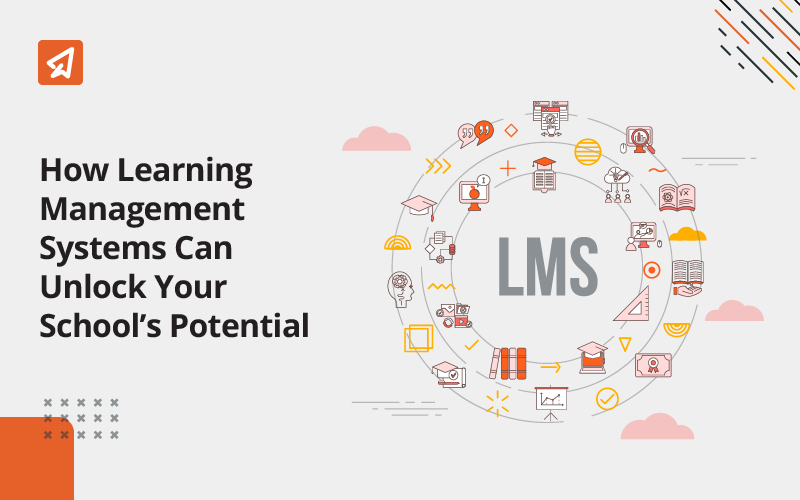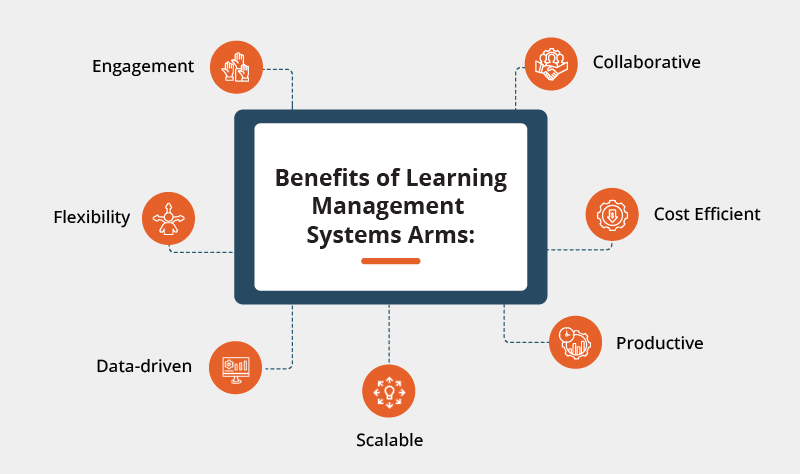How Learning Management Systems Can Unlock Your School’s Potential

In the education sector, it is important to be adaptable to remain competitive. This is especially true in light of the technological revolution we are currently witnessing. In recent years, the way we teach and learn has transformed drastically. The pandemic acted as a catalyst that propelled educational institutions into the world of online learning. Amid this transformation, Learning Management Systems (LMS) emerged as invaluable tools that have eased the shift to digital classrooms and have redefined the way we approach education. Let’s explore more on the advantages of LMS.
The Advantages of Implementing an LMS in Education

Incorporating a Learning Management System (LMS) into your educational institution brings a multitude of benefits:
1. Improved Engagement
One of the cornerstones of LMSes is their ability to offer diverse learning materials. Teachers can craft engaging content using multimedia elements, from interactive quizzes to video lectures. This diversity keeps students invested, making learning not just informative but enjoyable. With Extramarks, students get access to a plethora of resources including 3D video, multimedia and game-based content which helps keep students engaged.
2. Unmatched Flexibility
LMSes introduce a new era of flexibility in education. Students can access learning content at their convenience, from anywhere with an internet connection. Whether it’s revisiting a video lecture or accessing new course materials, students have the autonomy to shape their learning journey. This accessibility empowers a self-paced learning approach.
3. Integrated and Scalable Solutions
LMSes aren’t just platforms; they are ecosystems. They integrate features such as calendars, discussion forums, and communication channels to create comprehensive solutions for e-learning. For institutions supporting multiple educators, LMS platforms like Extramarks Smart Class Plus provide easy scalability. They simplify the sharing of content, attendance tracking, assignments, examinations and much more.
4. Efficient Productivity and Time Management
Gone are the days of sifting through piles of notebooks and files. LMSes streamline assignments, deadlines, and submissions. This integrated system allows teachers to monitor student progress, provide timely assistance, and track submissions effortlessly. It’s a win-win, promoting productivity for educators and better time management for students.
5. Cost Efficiency and Resource Conservation
In an age of environmental consciousness, LMSes offer a valuable eco-friendly alternative. Coursework can now be stored and accessed digitally which reduces the need for paper and books. This helps in conserving both funds and resources. What’s more, digital content is a renewable resource. It can be reused for subsequent batches with minimal modifications.
6. Data-Driven Insights
LMS platforms are rich sources of data that can drive informed decision-making. By analyzing student performance, engagement, and completion rates, educators can make data-driven adjustments to their teaching strategies and course content. This data-driven approach helps identify areas for improvement and tailor instruction to meet the specific needs of students, ultimately leading to better learning outcomes. The Extramarks Teaching App offers teachers data-driven insights on our analytics dashboard to help them learn their students’ strengths and weaknesses.
7. Collaboration
LMS platforms foster collaboration among students and educators. They provide tools for collaborative projects, group discussions, and peer-to-peer learning. Such collaboration not only enhances the learning experience but also prepares students for the collaborative nature of the modern workplace.
8. Automation
LMS platforms like the Extramarks Teaching App automate various administrative tasks, such as grading papers, assignment submissions, attendance tracking, etc. This automation reduces the administrative burden on teachers, allowing them to focus more on teaching and interacting with students.
Tips for Schools Adopting an LMS
Implementing an LMS effectively requires careful planning and execution. Here are practical tips to ensure a seamless transition:
1. Select the Right LMS
When choosing an LMS, research and evaluate various options to find one that aligns with your educational goals and offers the necessary features. Consider scalability, user-friendliness, and compatibility with your existing systems. The right LMS should enhance your teaching approach and meet the unique needs of your institution.
2. Comprehensive Training and Onboarding
Invest in robust training programs for your staff. Ensure they are well-versed in utilizing the LMS features to their full potential. A well-trained staff can leverage the platform to provide students with an exceptional learning experience. Similarly, develop a structured onboarding process for students. Provide tutorials, support resources, and clear instructions to help them navigate the LMS effortlessly.
3. Gradual Transition
Plan a phased introduction of the LMS into your curriculum. Start with pilot programs involving a small group of educators and students. Gather feedback and fine-tune the system based on their experiences. As you expand, gradually implement the LMS across all courses. This approach allows time for adjustment, and troubleshooting, and ensures that everyone is comfortable.
4. Customization
Leverage the flexibility of the LMS to customize and personalize the learning experience. Tailor the platform to align with your institution’s specific teaching methods and goals. For example, you can customize the content to reflect your curriculum. Personalized learning paths can enhance engagement and cater to individual student needs.
5. Continuous Support and Feedback
Offer ongoing support and resources to both educators and students. Create a dedicated support team or helpdesk to address any technical issues or questions promptly. Encourage open communication channels for feedback. Regularly seek input from users to identify areas for improvement.
It is clear that Learning Management Systems (LMS) have gone from being a convenience to a necessity in modern education. Their ability to enhance engagement, flexibility, efficiency, and sustainability is reshaping the educational landscape. As educators and institutions strive to provide quality education in the digital age, LMSes emerge as pivotal tools in this endeavour. If your institute is looking to integrate digital solutions with your existing infrastructure, consider adding Extramarks Smart Class Plus to your team.
Last Updated on April 17, 2024









